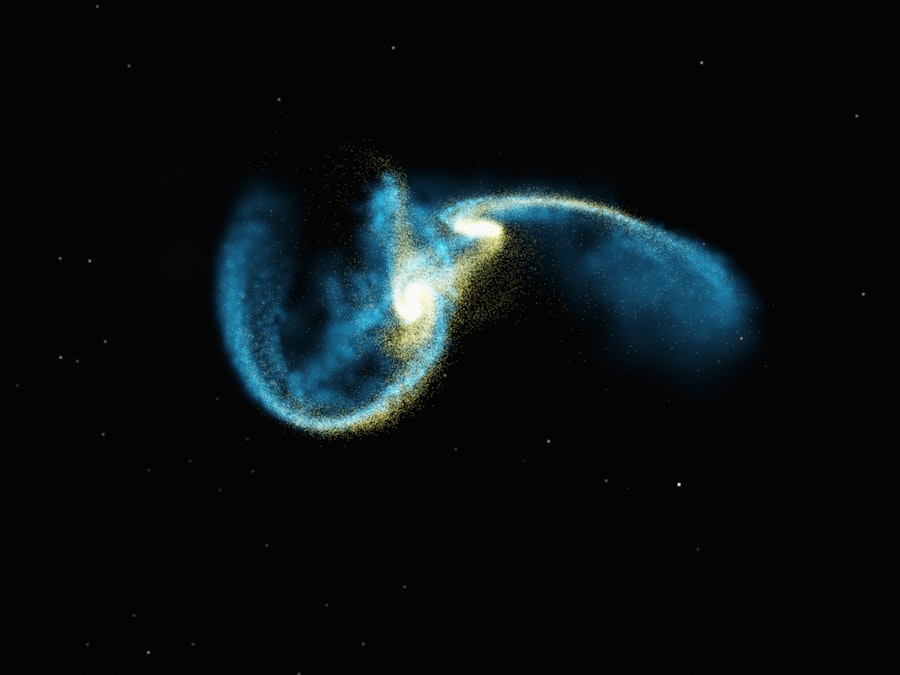Black holes have long captivated the imagination of scientists and the public alike, serving as a focal point for discussions about the universe’s most enigmatic phenomena. These regions of spacetime exhibit gravitational forces so intense that nothing, not even light, can escape their grasp. The concept of a black hole arises from the equations of general relativity, formulated by Albert Einstein in the early 20th century.
As massive stars exhaust their nuclear fuel, they undergo gravitational collapse, leading to the formation of these mysterious entities. The event horizon, a boundary surrounding a black hole, marks the point of no return; once crossed, all matter and information are inexorably drawn into the singularity at the center. The study of black holes has evolved significantly since their theoretical inception.
Initially dismissed as mere mathematical curiosities, they have since been confirmed through various astronomical observations. The first direct image of a black hole’s event horizon was captured in 2019 by the Event Horizon Telescope, providing compelling evidence for their existence. As researchers delve deeper into the nature of black holes, they uncover not only their formation and characteristics but also their potential implications for our understanding of the universe.
The exploration of black holes raises profound questions about the fabric of reality itself, challenging existing paradigms in physics and cosmology.
Key Takeaways
- Black holes are regions in space where the gravitational pull is so strong that nothing, not even light, can escape.
- Hawking radiation is a theoretical prediction that suggests black holes can emit radiation and eventually evaporate over time.
- Theoretical predictions for black hole fate include the idea that black holes can completely evaporate or leave behind remnants.
- Observational evidence for black hole evaporation is still being sought after, but indirect evidence has been found in the form of gamma-ray bursts.
- The information paradox arises from the conflict between the principles of quantum mechanics and the classical theory of black holes, leading to questions about the fate of information consumed by black holes.
Hawking Radiation and Black Hole Evaporation
One of the most groundbreaking concepts associated with black holes is Hawking radiation, a phenomenon predicted by physicist Stephen Hawking in 1974. This theoretical radiation arises from quantum effects near the event horizon, where particle-antiparticle pairs spontaneously form. In this process, one particle may fall into the black hole while the other escapes, leading to a gradual loss of mass for the black hole over time.
This mechanism suggests that black holes are not entirely black; instead, they emit radiation and can eventually evaporate completely. The implications of Hawking radiation are profound, as they challenge the notion that black holes are eternal entities. If they can emit radiation and lose mass, it raises questions about their ultimate fate.
The evaporation process is incredibly slow for large black holes, taking longer than the current age of the universe for them to dissipate completely. However, smaller black holes, such as primordial black holes formed in the early universe, could evaporate much more rapidly. This concept introduces a dynamic aspect to black holes, suggesting that they are not merely passive objects but active participants in the cosmic dance of matter and energy.
Theoretical Predictions for Black Hole Fate

The fate of black holes has been a subject of intense theoretical investigation. As they emit Hawking radiation and lose mass, they approach a critical point where their size diminishes significantly. Theoretical models suggest that as a black hole shrinks, its temperature increases due to the inverse relationship between mass and temperature in black hole thermodynamics.
This leads to an accelerated evaporation process, culminating in a final burst of energy as the black hole reaches its last moments. Some theories propose that black holes could leave behind remnants after complete evaporation. These remnants might be stable objects that carry information about the matter that once fell into the black hole.
However, this idea raises further questions about the nature of these remnants and whether they can retain information in accordance with quantum mechanics. Theoretical physicists continue to explore various scenarios regarding black hole fate, including whether they could transition into other forms of matter or energy or if they might simply vanish without a trace.
Observational Evidence for Black Hole Evaporation
| Observational Evidence | Black Hole Evaporation |
|---|---|
| X-ray emissions from black hole binaries | Support the idea of black hole evaporation |
| Observations of Hawking radiation | Indirect evidence for black hole evaporation |
| Stellar-mass black holes in binary systems | Provide insights into the evaporation process |
While Hawking radiation remains largely theoretical due to its incredibly weak nature, researchers have sought indirect evidence for black hole evaporation through various observational methods. One approach involves studying high-energy cosmic events that could be linked to evaporating black holes. For instance, gamma-ray bursts or other energetic phenomena might provide clues about the final stages of black hole life cycles.
Additionally, scientists have explored the possibility of detecting primordial black holes through their potential evaporation signatures. If these smaller black holes exist in significant numbers, their rapid evaporation could produce detectable bursts of radiation or other observable effects in the cosmic background. While direct evidence remains elusive, ongoing advancements in observational technology and techniques may eventually yield insights into the elusive nature of black hole evaporation.
The Information Paradox
The information paradox is one of the most perplexing challenges in modern theoretical physics, arising from the interplay between quantum mechanics and general relativity. According to quantum theory, information cannot be destroyed; however, if a black hole evaporates completely through Hawking radiation, it appears that any information about the matter that fell into it is lost forever. This contradiction has led to heated debates among physicists regarding the fundamental principles governing reality.
Various proposed solutions to the information paradox have emerged over the years. Some theorists suggest that information may be encoded in subtle correlations within Hawking radiation itself, allowing it to be recovered despite the apparent loss during evaporation. Others propose that information could be preserved in a holographic manner on the event horizon or that it might be released during the final moments of a black hole’s life cycle.
The resolution of this paradox remains an open question and continues to drive research in quantum gravity and black hole physics.
Potential Implications for the End of Black Holes

The eventual fate of black holes carries significant implications for our understanding of cosmology and fundamental physics. If black holes can evaporate completely, it challenges traditional views about their permanence in the universe. This notion raises questions about what happens to the information contained within them and how it relates to the broader fabric of spacetime.
Moreover, if black holes do leave behind remnants or other forms of matter after evaporation, it could lead to new insights into dark matter or other unexplained phenomena in astrophysics. The study of black hole evolution may also shed light on the early universe’s conditions and how structures formed over cosmic time. As researchers continue to explore these implications, they may uncover new connections between seemingly disparate areas of physics.
Theoretical Models for Black Hole Remnants
The concept of black hole remnants has garnered considerable attention among theoretical physicists seeking to reconcile the information paradox with established principles of quantum mechanics. Various models have been proposed to describe these remnants, ranging from stable particles to exotic forms of matter that could exist beyond our current understanding. One intriguing idea is that remnants could possess unique properties that allow them to retain information about their previous states while still conforming to quantum mechanical principles.
These remnants might serve as a bridge between classical and quantum realms, offering insights into how information is preserved in extreme gravitational environments. As researchers develop more sophisticated models and simulations, they hope to gain a clearer understanding of what these remnants might look like and how they could influence future cosmic evolution.
The Search for Primordial Black Holes
Primordial black holes are hypothesized to have formed shortly after the Big Bang due to density fluctuations in the early universe. Unlike stellar black holes formed from collapsing stars, primordial black holes could vary significantly in size and mass. Their potential existence has sparked interest among cosmologists and astrophysicists alike, as they may provide valuable insights into dark matter and other unresolved questions in cosmology.
The search for primordial black holes involves examining various cosmic phenomena that could be linked to their presence. For instance, gravitational wave detections from merging black holes may offer clues about their origins and characteristics. Additionally, researchers are investigating potential signatures left by evaporating primordial black holes in cosmic background radiation or high-energy cosmic rays.
As observational techniques advance, scientists hope to uncover evidence supporting or refuting the existence of these elusive entities.
The Role of Quantum Gravity in Black Hole Evolution
Quantum gravity remains one of the most significant challenges in theoretical physics, as it seeks to unify general relativity with quantum mechanics. Understanding how gravity operates at quantum scales is crucial for comprehending phenomena like black hole evolution and evaporation. Various approaches to quantum gravity have emerged over the years, including string theory and loop quantum gravity.
These theories aim to provide a framework for understanding how spacetime behaves under extreme conditions, such as those found near a black hole’s event horizon. By exploring how quantum effects influence gravitational interactions, researchers hope to gain insights into how information is preserved during black hole evaporation and what happens at singularities. The interplay between quantum gravity and black hole physics represents a frontier in modern science that could reshape our understanding of reality itself.
Black Hole Merger and Remnant Formation
Black hole mergers are among the most dramatic events in astrophysics, resulting from the gravitational attraction between two massive objects spiraling toward each other until they collide. These mergers not only produce gravitational waves detectable by observatories like LIGO but also raise questions about what happens to the remnant formed after such an event. The remnant left behind after a merger can vary depending on the masses involved and their spin characteristics.
In some cases, it may result in a larger black hole that continues to evolve through processes like accretion or further mergers with other black holes. Understanding these dynamics is essential for piecing together the life cycles of black holes and their role in cosmic evolution.
Future Observational and Theoretical Challenges in Understanding Black Hole Fate
As scientists continue to explore the mysteries surrounding black holes, numerous challenges remain on both observational and theoretical fronts. Detecting Hawking radiation directly poses significant difficulties due to its weak nature compared to other cosmic signals.
On the theoretical side, reconciling various models related to black hole evaporation and information retention requires ongoing collaboration among physicists from diverse fields. As new discoveries emerge from observational data and theoretical advancements unfold, researchers must remain adaptable in their approaches to understanding these complex entities’ ultimate fate.
The interplay between observation and theory will continue to shape our understanding of these enigmatic objects as researchers strive to unlock their secrets within the cosmos.
After black holes evaporate, a fascinating question arises about the fate of the information that once resided within them. This topic is explored in depth in a related article on Freaky Science, which discusses the implications of black hole evaporation and the theories surrounding information loss. For more insights, you can read the article here: Freaky Science.
WATCH THIS! The Universe Will Die In Silence. This Is The Googol Year Timeline.
FAQs
What is black hole evaporation?
Black hole evaporation is a theoretical process proposed by physicist Stephen Hawking, in which black holes emit radiation and gradually lose mass over time. This process is due to quantum effects near the event horizon of the black hole.
What happens after black holes evaporate?
After black holes evaporate completely, they cease to exist. The final stages of evaporation release a burst of energy, and the black hole’s mass is converted into particles and radiation.
What is the significance of black hole evaporation?
Black hole evaporation is significant because it reconciles the laws of quantum mechanics with the existence of black holes. It also has implications for the ultimate fate of black holes and the information paradox.
What is the information paradox?
The information paradox is a theoretical puzzle in physics that arises from the fact that black hole evaporation seems to destroy information, violating the principles of quantum mechanics. Resolving this paradox is a major challenge in theoretical physics.
Can anything escape from a black hole during evaporation?
During the process of evaporation, particles and radiation can escape from the black hole. This is known as Hawking radiation, and it is the mechanism by which black holes lose mass and eventually evaporate completely.
What are the implications of black hole evaporation for the universe?
The evaporation of black holes has implications for the long-term evolution of the universe. As black holes evaporate, they release energy and mass, which could have observable effects on the surrounding space. Additionally, the resolution of the information paradox could have profound implications for our understanding of fundamental physics.
